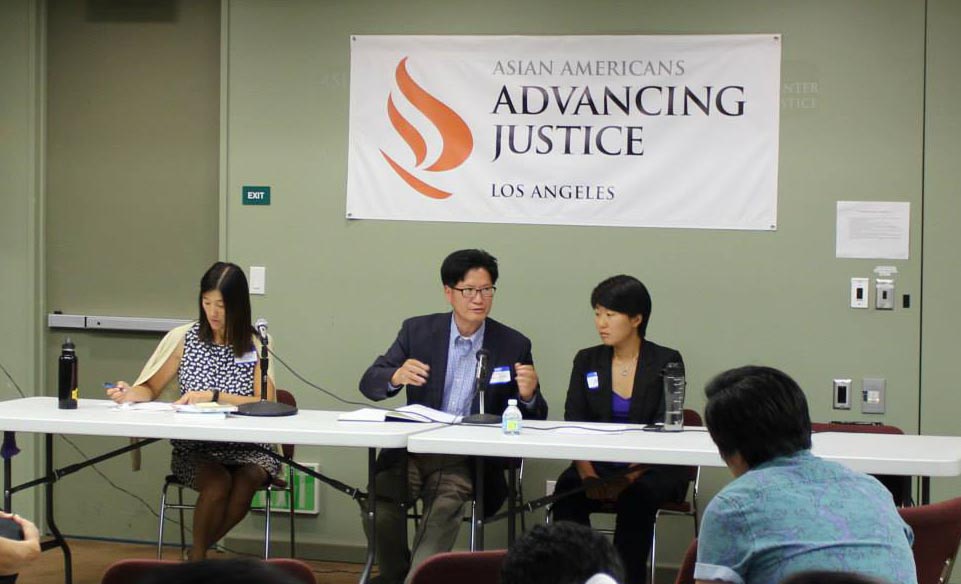Above image: (From left) Julayne Lee, Steve Morrison, Jenna Ness. Photo courtesy of KAYLT.
by JAMES S. KIM
The subject of adoption has a long, diverse and sometimes controversial history in the Korean American community. Some estimates say that as many as one in 10 Korean Americans is adopted. In other words, adoption is a major part of Korean American history.
In an effort to help educate the community, especially the younger generations, about the unique experiences of Korean American adoptees, members of the Korean American Youth Leaders in Training (KAYLT) program hosted a forum in Los Angeles on Tuesday night. Among the speakers were Korean American adoptees Julayne Lee, Steve Morrison, Jenna Ness and Emile Mack, who shared their stories and also talked about some of the complex facets of adoption from Korea—an issue still debated today.
One common theme among the speakers was the issue of acceptance, or lack thereof.
Emile Mack, was adopted into an African American family with parents who “never treated [him] differently,” but as he grew older, the question of his identity began to loom larger.
“As I had my encounter with different identities, I would get the thing of, when I meet Asians, they would say, ‘You look like us, but you don’t act like us,'” Mack said. “When I bump into African Americans, they’d say, ‘You sure don’t look like us, but you kind of act like us. … He’s the Asian kid that has rhythm.'”
Despite a rough childhood, Mack said those experiences helped make him tougher, and growing up being accustomed to feeling different helped him face deal with some of the racial issues going into his career. When he first began as a firefighter, he profession was dominated by white men.
“The things that you guys are going to go through, although adverse, in the end, are going to help you help you grow stronger, more determined,” he told the students. “Never be a victim, and allow anything to stop you. When you become a victim, you’ve made yourself a victim.”
 Emile Mack with wife Jenna and their daughter, Mia in their Redondo Beach home. Photo by Eric Sueyoshi/KoreAm.
Emile Mack with wife Jenna and their daughter, Mia in their Redondo Beach home. Photo by Eric Sueyoshi/KoreAm.
His parents’ influence played a part in Mack adopting his daughter Mia.
Steve Morrison, founder of the Mission to Promote Adoption in Korea (MPAK), also adopted two of his five children. He said his decision to adopt was largely due to his experience with his adoptive parents. “No adoption is perfect, except mine,” he lightheartedly remarked.
Morrison still acknowledged, however, that not all adoptions have had positive outcomes.
The issue of international adoption from Korea is a controversial one, as an estimated 200,000 Korean children have been adopted, mostly into white families in North America, Europe and Australia, since the end of the Korean War. The number of intercountry adoptions remained high even after Korea emerged as an economically stable country, and many blamed this on the strong social stigma against single mothers. In recent decades, under pressure from adoptee activists, South Korea has enacted laws designed to encourage single mothers to keep their children and promote domestic adoption. As a result, the number of Korean adoptees has decreased significantly over the last 20 years.
Yet, Morrison and other speakers said, despite these legislative changes, single mothers still contend with stigma and babies continue to be abandoned.
“I’m coming at [the issue] from a human rights standpoint, that a family has a right to stay together,” said Julayne Lee, an adoptee from Minnesota–the Land of 10,000 Korean American adoptees, as she put it. Lee was a member of G.O.A.’L (Global Overseas Adoptees’ Link), and she served on the ASK (Adoptee Solidarity Korea) steering committee until 2008 in South Korea, working with other adoptees to approach inter-country adoption from a more political, critical perspective.
Along with advocating for more comprehensive social welfare programs to increase domestic adoption and help single mothers, Lee also worked on a campaign that allowed a number of Korean adoptees to reclaim Korean citizenship on the condition that the receiving country recognized dual citizenship.
“I think it has given some people a piece of their identity they wanted for a long time,” Lee said.
Jenna Ness spent years trying to come to peace with her own identity as a queer Korean American adoptee.
“With the LGBTQ community, their ‘coming out’ is a huge issue,” said Jenna Ness, who identifies as a queer adoptee. “It’s been part of my journey–coming out as queer, but also coming out as an adoptee.”
Ness has organized gatherings for queer adoptees with Also-Known-As (AKA), an adoptee-led community organization in New York City, and she spoke on a Queer Asian Adoptee Panel at the New York City Asian American Student Conference (NYCAASC). She and her two triplet sisters successfully found and reunited with their Korean family in 2010, but she said she hasn’t come out to them because she doesn’t know how they would respond.
“I think as Korean adoptees, we all obviously have diverse stories, but I think many of us can relate to is feeling different and feeling unaccepted,” Ness said. “I’d like to see the Korean adoptee community … push the boundaries in terms of, who isn’t accepted, who’s marginalized in society and how we can be better about accepting people who are different and how we can challenge social norms and challenge oppression.”
About 40 people, many of them high school- and college-aged, attended the forum, held at the offices of Asian Americans Advancing Justice-Los Angeles. KAYLT is a program of the nonprofit K.W. Lee Center for Leadership, which was founded to help nurture “community consciousness”—a quality of the organization’s namesake, journalist K.W. Lee—among young people.









